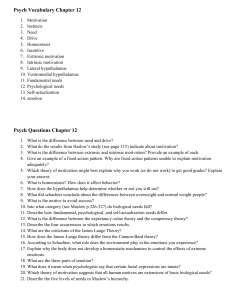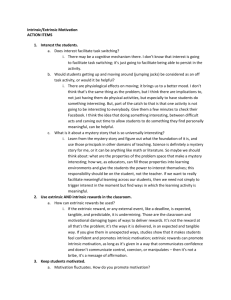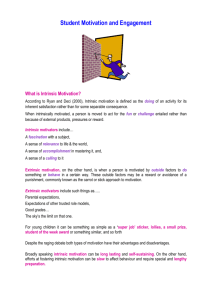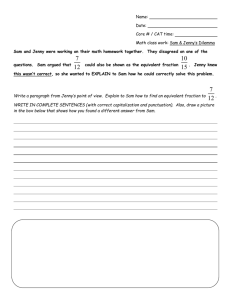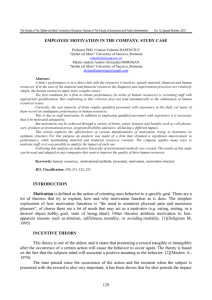Educational Psychology: Motivation Quiz
advertisement
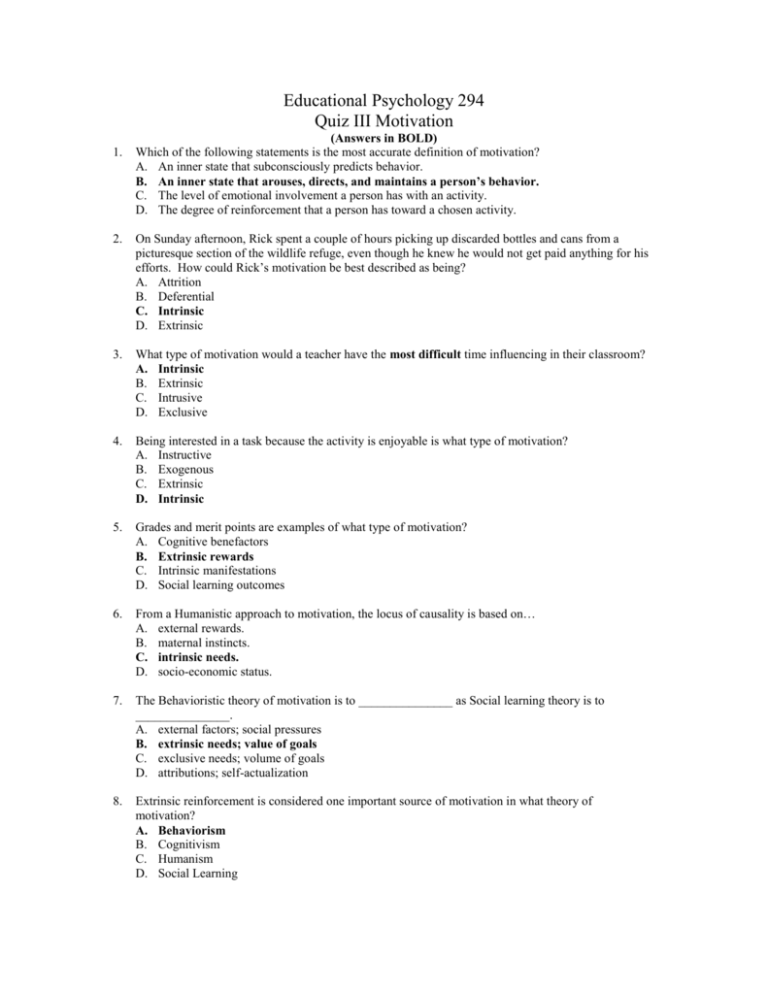
Educational Psychology 294 Quiz III Motivation 1. (Answers in BOLD) Which of the following statements is the most accurate definition of motivation? A. An inner state that subconsciously predicts behavior. B. An inner state that arouses, directs, and maintains a person’s behavior. C. The level of emotional involvement a person has with an activity. D. The degree of reinforcement that a person has toward a chosen activity. 2. On Sunday afternoon, Rick spent a couple of hours picking up discarded bottles and cans from a picturesque section of the wildlife refuge, even though he knew he would not get paid anything for his efforts. How could Rick’s motivation be best described as being? A. Attrition B. Deferential C. Intrinsic D. Extrinsic 3. What type of motivation would a teacher have the most difficult time influencing in their classroom? A. Intrinsic B. Extrinsic C. Intrusive D. Exclusive 4. Being interested in a task because the activity is enjoyable is what type of motivation? A. Instructive B. Exogenous C. Extrinsic D. Intrinsic 5. Grades and merit points are examples of what type of motivation? A. Cognitive benefactors B. Extrinsic rewards C. Intrinsic manifestations D. Social learning outcomes 6. From a Humanistic approach to motivation, the locus of causality is based on… A. external rewards. B. maternal instincts. C. intrinsic needs. D. socio-economic status. 7. The Behavioristic theory of motivation is to _______________ as Social learning theory is to _______________. A. external factors; social pressures B. extrinsic needs; value of goals C. exclusive needs; volume of goals D. attributions; self-actualization 8. Extrinsic reinforcement is considered one important source of motivation in what theory of motivation? A. Behaviorism B. Cognitivism C. Humanism D. Social Learning 9. Dennis often “dupes” his friends into letting him reuse one of their papers from last semester for his assignment in educational psychology this semester. In terms of goals, what type of learner does Dennis seem to be? A. Self-involved B. Other-involved C. Task-involved D. Ego-involved 10. Students with performance goals as opposed to learning goals are concerned primarily with… A. achievement motivation. B. looking good to peers. C. learning for the sake of learning. D. finishing tasks on their “to do” lists. 11. Which one of the following quotes best exemplifies a learning goal? A. Jason will sure be impressed when I know how to do this lab. B. This class will be great preparation for me when I have a job in this field C. The sooner that I finish this essay, the sooner I can go to the student union and play darts. D. I think that the best chance I have for an “A” will be option 3. 12. In Maslow’s hierarchy, “esteem” is considered to be what type of need? A. Deficiency B. Growth C. Being D. Proficiency 13. According to Maslow, a person feeling a need to perform a skill with beauty and grace is an example of what level of need? A. Safety B. Belonging C. Self-actualization D. Aesthetic 14. When “growth” needs are met, motivation to satisfy them will generally… A. be unaffected. B. decrease substantially. C. increase. D. cease to exist. 15. Maslow’s hierarchy of needs has been criticized because… A. cognition plays too small a role. B. people frequently attend to multiple needs at the same time. C. survival needs receive too much emphasis. D. people are reinforced in their behavior. 16. Sam’s father has just recently become unemployed, and the family is in financial trouble. Lately, Sam’s schoolwork has begun to slip. He has not been doing as well on quizzes, and his homework is rarely finished anymore. What would Maslow say about Sam? A. Sam has ineffective learning goals. B. Sam’s “physiological needs” are interfering with his “growth needs.” C. Sam’s “growth needs” should be emphasized over his “being needs.” D. Sam’s teacher should redirect Sam’s performance goals. 17. Each of the situations listed below represents a need in Maslow’s hierarchy. Which of the items would have to be satisfied before any other? A. Anna is not included in the “in group” of her class. B. A neighborhood gang has threatened Carlos. C. Mai wants to develop his artistic talents in music. D. Joy feels inferior but wants to be important. 17. As Jane looks at her report card, she remarks to Judy, “I got that “B” because I really didn’t work hard in Dr. Schopenhaur’s Organic Chemistry class.” On the basis of this one statement, we might guess that Jane has a(n)… A. internal locus of control. B. external locus of control. C. achievement motivation. D. serious motivational breakdown. 18. Jamal has an internal locus of control. Consequently, he is likely to attribute his grades in school to… A. his own effort. B. his mother’s attitude. C. bad luck. D. the teacher’s instruction. 19. An internal-stable-controllable attribution is exemplified by… A. innate ability. B. luck of the draw. C. task difficulty. D. typical effort.
